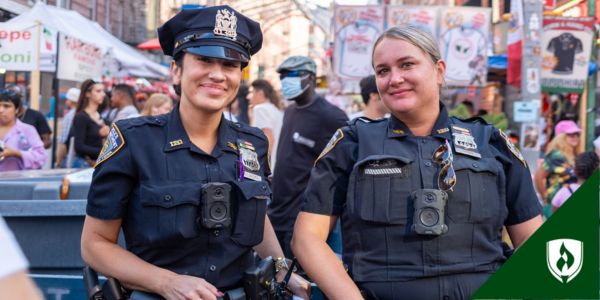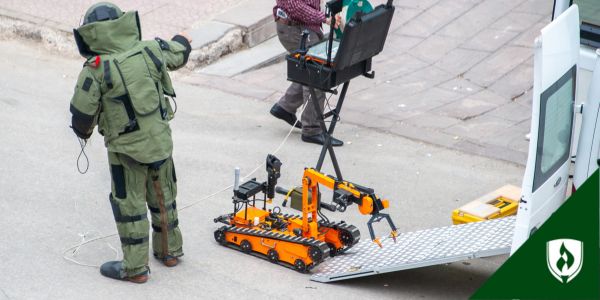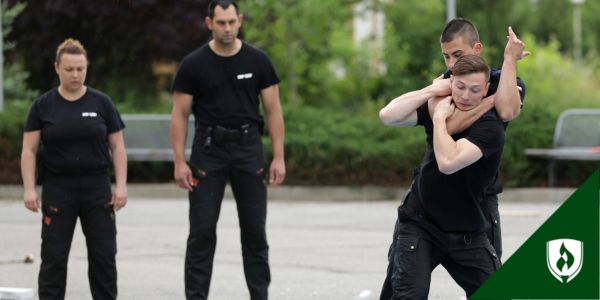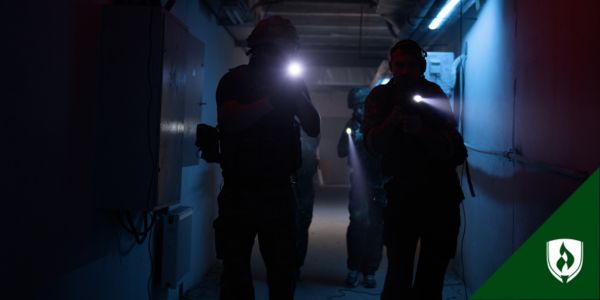.jpg)
We’ve all seen them. The distinct red and blue flashing lights on the side of the road, a police officer stationed at the entrance of an event or the patrol vehicles found in and around our state and national parks. We don’t think twice about these sightings because we know that police officers are universally present throughout our communities. But do you ever stop to think about what type of police officer those people you see are?
It’s easy to mentally lump all law enforcement officers together as just “the police” if interacting with these people isn’t a normal occurrence in your life. But believe it or not, there are more types of police officers than you might have guessed, and they each have different job duties and are assigned to work in a variety of different settings. Some police officers work in big cities, some in some small towns and some patrol state highways. But these aren’t the only places police officers work, and they certainly do much more than patrol. If you are interested in a career in law enforcement, you are going to want to learn more about the options out there.
10 Types of law enforcement officers
There’s more variety in law enforcement roles than you might realize. Let’s take a closer look at ten common types of law enforcement officers and the work they do.
1. Uniformed officers
When it comes to general law enforcement duties such as maintaining regular patrols and responding to emergency calls, uniformed police officers are likely the ones behind the wheel. Whether working in a big city or a small town, these officers are also involved in investigating criminal activity, directing traffic and generally helping citizens in need. Uniformed police officers are likely to be assigned to a specific area of a community and will become familiar with that area, so they can sense anything out of the ordinary and resolve any issues.
The education required for becoming a uniformed police officer ranges from a high school diploma to a college degree. Additionally, officers will likely need to attend a state approved training academy and pass any examinations the agency requires.
2. Detectives
Police detectives are active at crime scenes and spend their time investigating the scene to piece together what happened. Detectives will work with witnesses and suspects, interviewing them and compiling clues and evidence. As the primary investigative fact-finder in many court cases, they are responsible for writing meticulous official reports detailing all of the information they gather. As you might expect, detectives need to be very detail-oriented—every bit of evidence, interview and action they take will be under intense scrutiny by legal defense teams and even seemingly small mistakes can lead to major issues with cases.
Becoming a detective typically requires first beginning your career as a standard uniformed police officer before being promoted to a detective within the department. This promotion may require passing an examination or other continuing education work.
3. State police and highway patrol officers
It’s likely you’ve seen the different colored vehicles of state police or highway patrol, but are you aware of exactly what they do? State police are often busy patrolling highways, but they also play a crucial role in assisting local police agencies when emergencies or investigations extend beyond their resources and jurisdictions. These state law enforcement officials are often relied on to assist with law enforcement duties in small towns and rural areas.
The requirements for becoming a state patrol officer are similar to what you’d find for most uniformed police roles—the primary difference is the agency you’d be applying to work for.
4. Fish and game wardens
Sometimes overlooked in the world of law enforcement, fish and game wardens are the law enforcement professionals tasked with enforcing the rules and regulations designed to protect wildlife. This type of officer often works for state conservation departments or federal agencies. Fish and game wardens play the primary role in enforcing fishing and hunting regulations. Not only will they patrol hunting and fishing areas, but they’ll also be responsible for conducting search and rescue operations and investigating complaints and accidents as well. Given the territory covered in this specialized role, fish and game wardens will often operate boats and off-road vehicles.
Competition for fish and game warden positions is fairly strong, and as such you’ll need a strong background of education and experience to find a job in this role. A bachelor's degree in a subject area related to conservation or biology may be required to become a fish and game warden for federal agencies like the U.S. Fish and Wildlife Service and the National Park Service.
5. Transit and railroad officers
Transit and railroad officers are probably not top-of-mind for most when it comes to law enforcement jobs. So what exactly do they do? These officers are responsible for patrolling public transportation areas like subways, commuter trains and freight railway stations. Officers in these roles are tasked with patrolling railyards—or other transportation hubs—to prevent vandalism, trespassing, theft, smuggling or other crimes commonly found along our transportation network.
In order to become a transit and railroad officer, candidates must first go through training at a police academy like uniformed police officers. Some cities and states require prospective transit and railroad police to take specialized training courses as well.
6. Sheriffs
Though they perform similar duties to that of a police chief, most sheriffs have at least one significant difference—they’re typically elected to the position by members of their community. Sheriffs and deputy sheriffs enforce the law in a similar way to local uniformed police officers, only their jurisdiction is at the county level, covering areas that are outside that of local police departments.
Becoming a sheriff requires more than simply being elected, though that can pose a challenge to the career. Sheriffs typically begin working as sworn uniformed police officers or sheriff’s deputies and gain experience in law enforcement before running for sheriff’s office.
7. Special jurisdiction police
Certain police agencies are dedicated to special geographic jurisdictions and enforcement responsibilities. Have you ever wondered who is responsible for policing places like college campuses or schools? Public college and university police forces, public schools and transportation systems like airports are all examples of jurisdictions where special jurisdiction police officers will work as uniformed officers.
Special jurisdiction police are generally full-service departments, offering the same services as local police. Interested candidates looking to work in this area of law enforcement should follow the same route as those becoming a uniformed police officer.
8. Air marshals
Federal air marshals hold a unique role within law enforcement. They specifically deter and defend the public and crew members against hostile passengers and acts of terrorism on any form of aviation including commercial flights.
This often means performing investigative work both on land and in the air. They also are deployed onto flights to actively protect the public and flight crew.
They are required to hold a bachelor’s degree at minimum and undergo 14 weeks of training through the federal government that includes both basic training and specific air marshal training comprised of physical fitness assessments, firearm training and tactical classes.
Aspiring air marshals should consider bachelor’s degrees in areas like Criminal Justice, Homeland Security, Criminology or Sociology.
9. Border patrol agents
While you might imagine border patrol agents following tracks in rural areas or performing routine customs checks at the border or the airport, they can work in many other capacities as well.
While many of them are responsible for surveying land and costal borders for smuggling and other illegal activities and communicating with those crossing the border, border patrol agents can also find specialized work within Customs and Border Patrol agency with opportunities in horse patrol, bike patrol, and emergency medical services.
If you’re looking for the best chance at becoming a border patrol agent, a combination of law enforcement experience and criminal justice college courses is a great place to start.
10. Crime scene investigator
Crime scene investigators, sometimes called forensic technicians or forensic scientists, are the law enforcement professionals who scour crime scenes for evidence, gathering and documenting what they find. Depending on the role, they may conduct laboratory analysis of the evidence they collect. Additionally they may be called on to testify as expert witnesses in criminal trials—this can require explaining complex subjects in plain language, so strong communication skills are a big plus.
To become a crime scene investigator, you’ll need to earn a bachelor’s degree in criminal justice or a related field like forensic science or biology before stepping into that crime scene or onto the witness stand.
Is a career in law enforcement in your future?
Whether you’re looking for adrenaline, consistency or just a meaningful career, it’s hard to go wrong in the law enforcement field. The types of law enforcement jobs you’ll find are varied and demand for these positions tends to remain steady—as long as laws exist there will be a need for someone to enforce them. If you’re looking for a way to jumpstart your law enforcement career in Minnesota, the Rasmussen University Law Enforcement programs might just provide the boost you need.1
1Professional Peace Officer Education (PPOE): This program meets standards established by the Minnesota Peace Officer Standards and Training Board (MN POST) for persons who seek employment in Minnesota as a peace officer. Graduates of this program may need to successfully complete additional academic coursework, training, practical/skills, and fitness standards before becoming eligible to sit for the MN Peace Officer Licensing Exam.
The Law Enforcement programs are not aligned to the standards of any professional licensing body other than the MN POST and are not intended to satisfy professional licensure requirements of any professional licensing agency in any other state.
EDITOR’S NOTE: This article was originally published in 2017. It has since been updated to include information relevant to 2019.




